
In mathematics and computer science, an algorithm is a finite sequence of mathematically rigorous instructions, typically used to solve a class of specific problems or to perform a computation. Algorithms are used as specifications for performing calculations and data processing. More advanced algorithms can use conditionals to divert the code execution through various routes and deduce valid inferences.
A paradigm shift is a fundamental change in the basic concepts and experimental practices of a scientific discipline. It is a concept in the philosophy of science that was introduced and brought into the common lexicon by the American physicist and philosopher Thomas Kuhn. Even though Kuhn restricted the use of the term to the natural sciences, the concept of a paradigm shift has also been used in numerous non-scientific contexts to describe a profound change in a fundamental model or perception of events.
In science and philosophy, a paradigm is a distinct set of concepts or thought patterns, including theories, research methods, postulates, and standards for what constitute legitimate contributions to a field. The word paradigm is Greek in origin, meaning "pattern".
An anti-pattern in software engineering, project management, and business processes is a common response to a recurring problem that is usually ineffective and risks being highly counterproductive. The term, coined in 1995 by computer programmer Andrew Koenig, was inspired by the book Design Patterns and first published in his article in the Journal of Object-Oriented Programming. A further paper in 1996 presented by Michael Ackroyd at the Object World West Conference also documented anti-patterns.
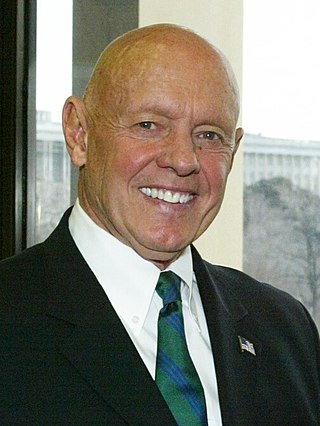
Stephen Richards Covey was an American educator, author, businessman, and speaker. His most popular book is The 7 Habits of Highly Effective People. His other books include First Things First, Principle-Centered Leadership, The 7 Habits of Highly Effective Families, The 8th Habit, and The Leader In Me: How Schools and Parents Around the World Are Inspiring Greatness, One Child at a Time. In 1996, Time magazine named him one of the 25 most influential people. He was a professor at the Jon M. Huntsman School of Business at Utah State University (USU) at the time of his death.
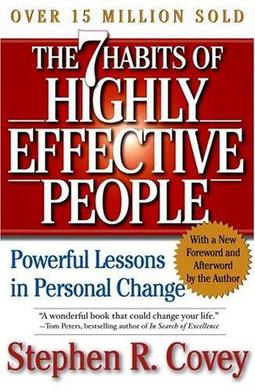
The 7 Habits of Highly Effective People, first published in 1989, is a business and self-help book written by Stephen R. Covey. The book goes over his ideas on how to spur and nurture personal change. The book also explores the concept of effectiveness in achieving results, the need for focus on character ethic rather than the personality ethic in selecting value systems. As named, his book is laid out through seven habits he has identified as conducive to personal growth.
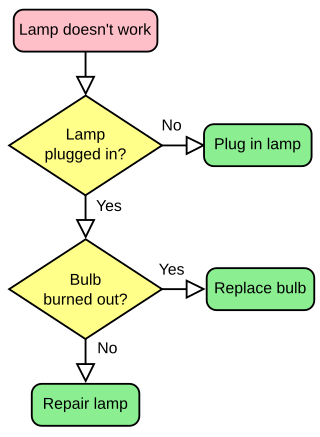
In psychology, decision-making is regarded as the cognitive process resulting in the selection of a belief or a course of action among several possible alternative options. It could be either rational or irrational. The decision-making process is a reasoning process based on assumptions of values, preferences and beliefs of the decision-maker. Every decision-making process produces a final choice, which may or may not prompt action.
Discipline is the self-control that is gained by requiring that rules or orders be obeyed, and the ability to keep working at something that is difficult. Disciplinarians believe that such self-control is of the utmost importance and enforce a set of rules that aim to develop such behavior. Such enforcement is sometimes based on punishment, although there is a clear difference between the two. One way to convey such differences is through the root meaning of each word: discipline means “to teach”, while punishment means “to correct or cause pain”. While punishment might extinguish unwanted behavior in the moment, it is greatly effective long-term due to consequences being understood and societal retribution to wrongs committed, while discipline usually is the process of training self control.
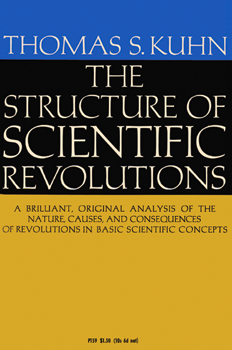
The Structure of Scientific Revolutions is a book about the history of science by the philosopher Thomas S. Kuhn. Its publication was a landmark event in the history, philosophy, and sociology of science. Kuhn challenged the then prevailing view of progress in science in which scientific progress was viewed as "development-by-accumulation" of accepted facts and theories. Kuhn argued for an episodic model in which periods of conceptual continuity and cumulative progress, referred to as periods of "normal science", were interrupted by periods of revolutionary science. The discovery of "anomalies" accumulating and precipitating revolutions in science leads to new paradigms. New paradigms then ask new questions of old data, move beyond the mere "puzzle-solving" of the previous paradigm, alter the rules of the game and change the "map" directing new research.

Theoretical computer science is a subfield of computer science and mathematics that focuses on the abstract and mathematical foundations of computation.
In planning and policy, a wicked problem is a problem that is difficult or impossible to solve because of incomplete, contradictory, and changing requirements that are often difficult to recognize. It refers to an idea or problem that cannot be fixed, where there is no single solution to the problem; and "wicked" denotes resistance to resolution, rather than evil. Another definition is "a problem whose social complexity means that it has no determinable stopping point". Moreover, because of complex interdependencies, the effort to solve one aspect of a wicked problem may reveal or create other problems. Due to their complexity, wicked problems are often characterized by organized irresponsibility.
Franklin Covey Co., trading as FranklinCovey and based in Salt Lake City, Utah, is a coaching company which provides training and assessment services in the areas of leadership, individual effectiveness, and business execution for organizations and individuals. The company was formed on May 30, 1997, as a result of merger between Hyrum W. Smith's Franklin Quest and Stephen R. Covey's Covey Leadership Center. Among other products, the company has marketed the FranklinCovey planning system, modeled in part on the writings of Benjamin Franklin, and The 7 Habits of Highly Effective People, based on Covey's research into leadership ethics.

Problem solving is the process of achieving a goal by overcoming obstacles, a frequent part of most activities. Problems in need of solutions range from simple personal tasks to complex issues in business and technical fields. The former is an example of simple problem solving (SPS) addressing one issue, whereas the latter is complex problem solving (CPS) with multiple interrelated obstacles. Another classification of problem-solving tasks is into well-defined problems with specific obstacles and goals, and ill-defined problems in which the current situation is troublesome but it is not clear what kind of resolution to aim for. Similarly, one may distinguish formal or fact-based problems requiring psychometric intelligence, versus socio-emotional problems which depend on the changeable emotions of individuals or groups, such as tactful behavior, fashion, or gift choices.
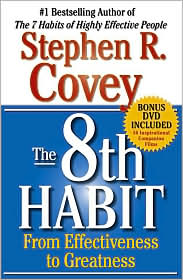
The 8th Habit: From Effectiveness to Greatness is a book written by Stephen R. Covey, published in 2004. It is the sequel to The Seven Habits of Highly Effective People, first published in 1989. The book clarifies and reinforces Covey's earlier declaration that "interdependence is a higher value than independence." This book helps its readers increase the dependence of themselves and others.
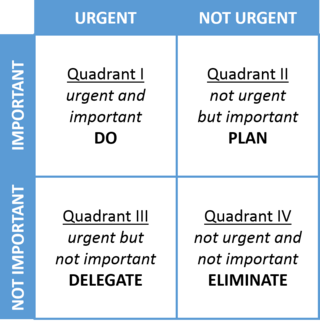
First Things First, sub-titled To Live, to Love, to Learn, to Leave a Legacy, (1994) is a self-help book written by Stephen Covey, A. Roger Merrill, and Rebecca R. Merrill. It offers a time management approach that, if established as a habit, is intended to help readers achieve "effectiveness" by aligning themselves to "First Things". The approach is a further development of the approach popularized in Covey's The Seven Habits of Highly Effective People and other titles.
Sean Covey is an American business executive, author, and speaker. He is President of FranklinCovey Education and also serves as Executive Vice President of Global Partnerships. Covey's works include The 4 Disciplines of Execution, The 6 Most Important Decisions You'll Ever Make, The 7 Habits of Happy Kids, and The 7 Habits of Highly Effective Teens, which has been translated into 20 languages and sold over 8 million copies worldwide.
The rational planning model is a model of the planning process involving a number of rational actions or steps. Taylor (1998) outlines five steps, as follows:

The Seven Habits of Highly Effective Teens is a 1998 bestselling self-help book written by Sean Covey, the son of Stephen Covey. The book was published on October 9, 1998 through Touchstone Books and is largely based on The Seven Habits of Highly Effective People. In 1999 Covey released a companion book entitled Daily Reflections For Highly Effective Teens.
Communication and leadership during change encompasses topics of communication and leadership during change. The goal of leader development is "the expansion of the person's capacity to be effective in leadership roles and processes". The two central elements to this are leadership can be learned, people do learn, grow, and change, and that leader development helps to make a person effective in a variety of formal and informal leadership roles.
Covey is a surname. Notable people with the surname include:









